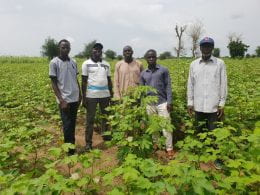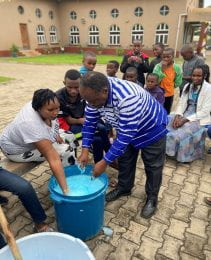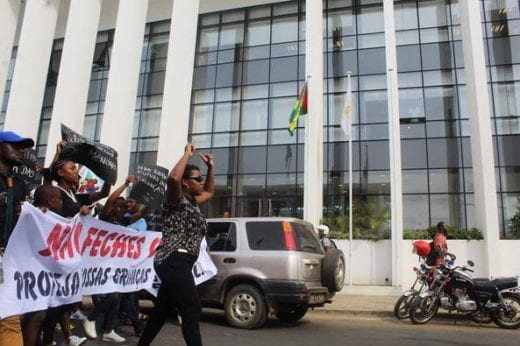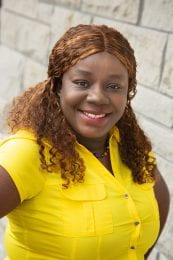The Mandela Washington Fellowship is a flagship program of the U.S. department of state to support young African leaders. The program includes Entrepreneurship, and Public Administration tracks, the Staley School hosts a Civic Leadership Institute.
The Fellows come from diverse backgrounds and are doing incredible work to impact lives and transform their communities. In this series, former Fellow and now Staley School graduate research assistant, Chibuzor Azubuike, reflects on 2022 Fellows that share common work in education – a critical area of focus for Sub-Saharan Africa.
According to the United Nations Education, Scientific and Cultural Organization (UNESCO), over one-fifth of African children between the ages of 6 and 11 are not in school, while nearly 60% of youth between the ages of 15 and 17 are not enrolled. (Kaledzi 2022) It is this challenge that Sustainable Development Goal 4 addresses, which is quality education.
Aside from education and youth development which are key areas that Mandela Washington Fellows hosted at Staley School are working on, it is interesting to see the impact that Fellows are making in their various countries, in addressing the challenges of inequality. Inequality in various forms, ranging from gender equality to upholding human rights, to mention but a few. The work of these young African leaders fighting the menace caused by inequality in Sub-Sahara Africa would be highlighted below.
Gender inequality
SDG 6, aims to tackle gender equality in the world by 2030, to this end we have change makers in their communities contributing their quota to ensure that this goal is realized, like Saykwayee Harmony Henry from Liberia , who is the founder of Kids Development Initiative a program designed to advocate for the rights and privileges of women and children in Liberia and the world. She is also the Communication Director for the National Young Women council of Liberia where she educates and trains more young women to get involved in politics and leadership. The Mandela Washington Fellowships increased her knowledge of fundraising, shifted her ways of thinking positively, and challenged her to keep fighting and work harder for greater success. Her greatest takeaway from the fellowship is “Do the best you can even when no one is watching.”

Ramatoulaye Biteye from Senegal is a young woman who is strongly advocating for women’s and children’s rights and dignities. She focuses on supporting girls to realize their academic pursuits based on the principles of integrity and hard work. She is doing excellent work in her community by fighting against harmful cultural practices such as female genital mutilation which is common in her society.
She described some of her challenges:
“Living in a traditional society, it is very difficult to fight for girls’ right because the practices are based upon cultural believes and most of the time society rejects us and called us radical feminists. Indeed, people view us as negative influencers of the young generation and tend to make our work difficult by telling youths not to follow us or integrate our community. Despite all these, we support women and girls to overcome their fears and work together to fight against all social injustices.”
Abelegue Alliance Fidele from Cameroon, engage local and community-based organizations to work closely together, Promote inclusion, equity and gender mainstreaming. He went further to state that the fellowship made him understand the best way to get beneficiaries involved in community service. “I have to work with community, not priory for them: We work with community and the community work for them. All initiatives must be community-driven,” Abelegue explains.

Over the past three years, Nyangah Rogers-Wright from Liberia has been working as a Program Coordinator at Purposeful, a feminist African-rooted hub for girl’s activism. The scope of her work has been geared towards youth participatory grant making, media engagement (Talkshow host), and facilitation of life-skills training for young mentors and adolescent girls.

Her greatest take away from the fellowship is it has helped shaped her idea of volunteering and service to humanity, the importance of relationship building, how power is perceived and that your title or salary shouldn’t determine how you relate with friends, colleagues and junior staffs. “I got to see older people render service to their communities and see our professors shuttle us around (They are awesome drivers, too). I think seeing – No hierarchies,” she says.
Upendo Raphael Mtataiko, hailing from Tanzania, champions the rights of women and girls in the Maasai community. She accomplishes this by empowering pastoralist women with advocacy and organizational skills, facilitating their access to legal services, and establishing platforms for their voices to be both individually and collectively articulated. By equipping these women with the tools and opportunities to become potent change-makers and advocates for their communities, they can effectively address pressing societal issues.

This approach is vital for their families and communities to fully harness their potential, especially given the sustainability challenges posed by their natural environment and limited resources. According to Upendo, the fellowship played a significant role in helping her discover her strengths and cultivate tolerance.
Human rights
Yoal from South Sudan, is a peace and human rights activist and founding director of the Pan – African Peacemakers Alliance (PAPA) and Dream and Deliver Hub with a professional interest in peace and conflict resolution. He recounts that his work is not a walk in the park, “As a non-profit leader, I face a lot of obstacles as a peace activist and human rights defender. I have been silenced, intimidated, harassed, detained, restricted to organize forums, and digitally and physically attacked by the national security personnel.”

Takemore Mhlanga is a Human Rights Defender works with Amalgamated Rural Teachers Union In Zimbabwe (ARTUZ). Takemore teachers ICT in in rural areas in Zimbabwe. He is also the Secretary For Young Teachers under ARTUZ where he is fighting for labour justice and inclusive access to quality education for all children in Zimbabwe. Currently, Mhlanga is carrying out an online campaign called #EduVote in which he is encouraging people in Zimbabwe to vote for people who support education. His greatest takeaway from fellowship is to value every idea and opinion regardless of who has contributed it. Building relations is the characteristic of a good leader.
Jessica Francisco Vaz das Neves, from São Tomé and Príncipe, is member of a non-profit called SOS Mulher working against Gender Based Violence , especially sexual violence, she contributes to put the issue of sexual violence in the public debate. She contributed to the enhancement in the law regarding child sexual abuse and working on the institution of the National Day Against Sexual Violence by the National Assembly as requested by us in a Petition signed by almost 7.000 people.


About the author
Chibuzor Mirian Azubuike is a Ph.D. candidate in leadership communication at Kansas State University. She is also a graduate teaching assistant at the Staley School of Leadership, where she teaches LEAD 350: Culture and Context of Leadership. She has experience in community development, facilitating leadership trainings and forced migration studies. Her interests include humanitarian interventions, civic leadership, youth development women and migration, and civic engagement.
